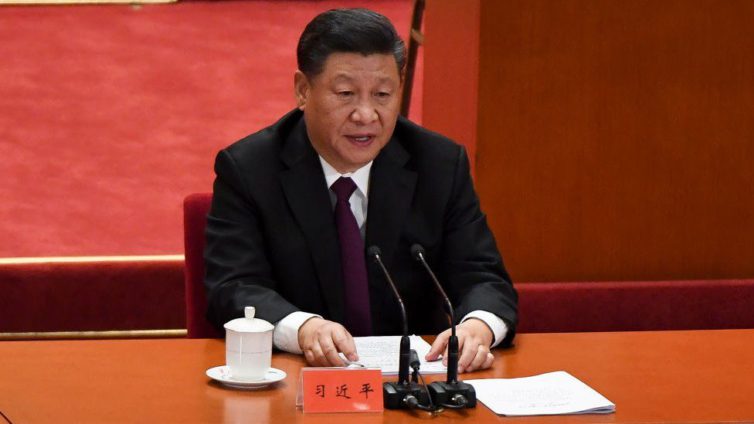China's President Xi Jinping has said in a speech that "reunification" with Taiwan "must be fulfilled".
Mr Xi added that unification should be achieved peacefully, but warned that the Chinese people had a "glorious tradition" of opposing separatism.
In response, Taiwan's presidential office said the future of the island lay in the hands of its people.
Taiwan considers itself a sovereign state. China, however, views Taiwan as a breakaway province.
Beijing has not ruled out the possible use of force to achieve unification.
Mr Xi's intervention follows a spate of about 150 Chinese military flights into Taiwan's air defence zone over the past week.
But the speech, which came on the 110th anniversary of the revolution that overthrew China's last imperial dynasty in 1911, was more conciliatory than his last major intervention on Taiwan in July, where he pledged to "smash" any attempts at formal Taiwanese independence.
"The historical task of the complete reunification of the motherland must be fulfilled, and will definitely be fulfilled," Mr Xi said.
He said he wanted to see peaceful unification occur under a "one country-two systems" policy, similar to that employed in Hong Kong.
"Taiwan independence separatism is the biggest obstacle to achieving the reunification of the motherland, and the most serious hidden danger to national rejuvenation," he added.
But Taiwan's presidential office said that public opinion was very clear in rejecting one country-two systems. It urged Beijing to abandon its "provocative steps of intrusion, harassment and destruction".
Despite the heightened tensions over the past several weeks, relations between China and Taiwan have not deteriorated to levels last seen in 1996 when China tried to disrupt presidential elections with missile tests and the US dispatched aircraft carriers to the region to dissuade them.
And while a number of Western countries have expressed concern at China's displays of military might, US President Joe Biden said Mr Xi had agreed to abide by the "Taiwan agreement".
Mr Biden appeared to be referring to Washington's longstanding "one China" policy under which it recognises China rather than Taiwan.
However, this agreement also allows Washington to maintain a "robust unofficial" relationship with Taiwan. The US sells arms to Taiwan as part of Washington's Taiwan Relations Act, which states that the US must help Taiwan defend itself.
The "One China" policy, which Mr Biden and Mr Xi are believed to have referred to, is a key cornerstone of Sino-US relations but is distinct from the One China principle, whereby China insists Taiwan is an inalienable part of one China to be reunified one day.
Latest Stories
-
Today’s Front pages: Tuesday, July 15, 2025
3 minutes -
Fitch affirms UBA Ghana’s Credit Rating at ‘B-’, citing strong profitability and capital buffers
2 hours -
‘SafeCare is Changing Lives’: Gradually redefining quality care in Ghana
2 hours -
NSA Director General graces Teqball National Club Championship, calls for corporate support
2 hours -
Novo Nordisk and American Society of Hematology announce new initiative to help improve sickle cell disease care in Africa
2 hours -
Telecel Ghana rewards 12th Dream Car Promo Winner with brand-new Hyundai Creta
2 hours -
No vigilante group can defy a determined police – CDD Ghana’s Dr Kojo Asante
2 hours -
Grow For Me: Transforming Agriculture through mobile investment
3 hours -
Musk’s Grok signs $200m deal with Pentagon days after antisemitism row
3 hours -
10 Chinese nationals denied bail in gold case
3 hours -
Work-and-pay driver remanded for car theft
3 hours -
Man arrested for allegedly stealing prepaid meters
4 hours -
South African car exports to U.S. plunge as Trump tariffs bite
4 hours -
Cameroon’s Biya, 92, brushes off health fears in bid for new term
4 hours -
Teddy bear made from fake human skin leads to California arrest
4 hours

